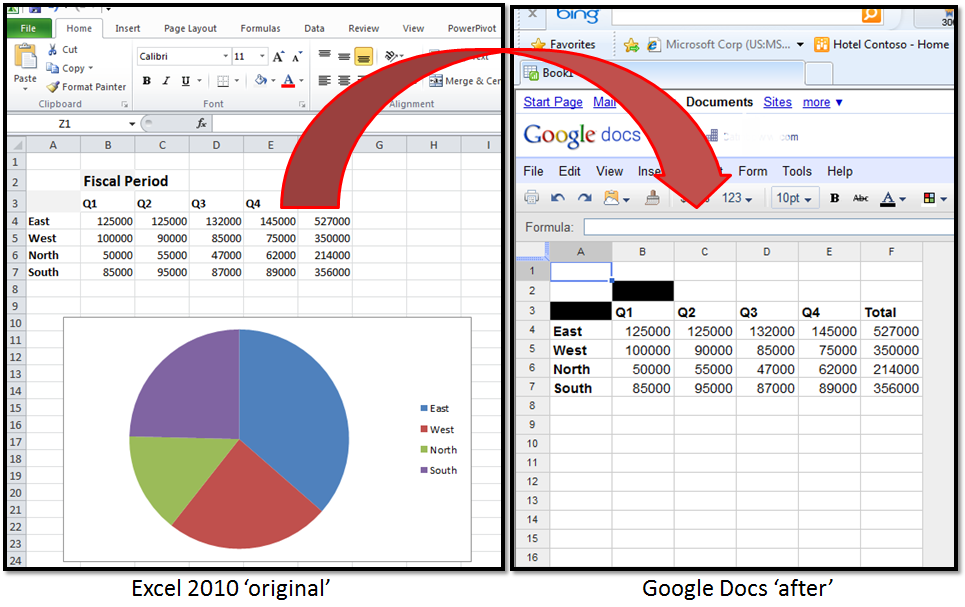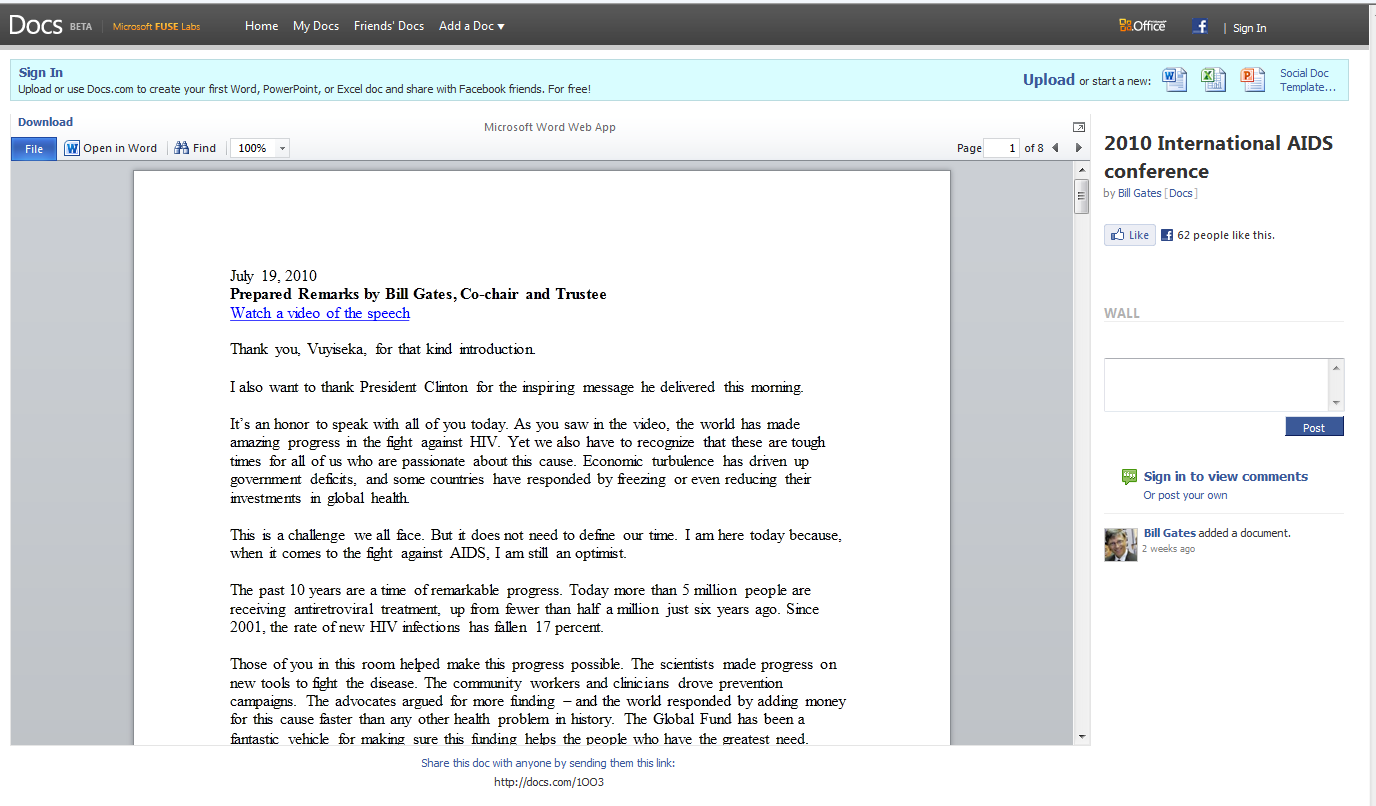A Tale of Two Cities – “Gone Google” and Microsoft Office 2010 twelve months later...
"It was the best of times, It was the worst of times…" the opening line of Dickens famous novel A Tale of Two Cities got me thinking about how busy the last twelve months have been for employees for the corporate campuses of Redmond (Microsoft) and Mountain View (Google).
Summary
A year ago, Google launched their attack advertising campaign dubbed 'Gone Google'. Extolling the virtues of software's "New Coke", Google has been attempting to gain credibility with paying customers (businesses) who may want to rely on the search vendor for their software needs.
It's a needed strategy in order to diversify the company's revenue stream (96% for Search/Ads) but also seeks to create 'pleasant side effects' that could harm Microsoft according to Dave Girouard, President, Google Enterprise Division. For context, please read Item #6 on the Google Manifesto.
Meanwhile, a year ago we launched the next wave of productivity software with Office 2010, SharePoint 2010 and Exchange 2010 all of which have entered the market with a 'Lions Roar' according to some analysts. We've also been busy deploying customers on our BPOS solutions and working hard to deliver on our roadmap for the future.
For the purposes of this blog, I will focus entirely on comparing the two companies' progress in the productivity software market over the past year. I recognize both companies have enjoyed great coverage from a variety of products outside this space which are worth discussing in the future.
Clear as Mud – Google Apps is a Replacement, No. It's a Compliment to Microsoft Office.
Last year, Google predicted that the vast majority of users would be able to replace Microsoft Office with Google Docs in 'twelve months'. Well, they've got three months left on that ambitious goal and switched their replacement tune to now claim Apps in fact makes "Office better"?
Regardless of their marketing speak; it's clear their developers have invoked a "can't beat 'em, then join 'em" strategy. In the last twelve months they've released a plug-in for Microsoft Outlook (with more pleasant 'side effects'), licensed the Microsoft Exchange ActiveSync protocol for device management and issued a promissory note of 'improved fidelity' for collaborating on Office documents.
In April of this year, the company admitted their browser apps had 'hit a wall' and decided to roll out an entirely different version, nixing offline document access with only three weeks' notice and no date for reinstatement and finally asked Corporate IT to install new browsers (Chrome) to gain access to more 'preview' code. This resulted in an unintended dual existence scenario for users who now had two versions of Docs, one for 'old' documents and one for 'new' documents each with different feature sets.
You can read the user comments on both Google Docs blog and Help forums and decide for yourself if Google has fully calculated such a drastic step. I am really not trying to throw rocks at the good folks at Google. As I've written before, I respect them tremendously. It's just interesting to see them endure feedback that comes along with being a software provider to people at work, school or in the home when you add features or attempt something different. We've been down this road before in the last 20 years of providing productivity software, so I recommend this case study by Forrester Research which covers how we develop software with customer feedback.
Based on my tests, you may want to withhold cashing that fidelity promissory note. (Excel 2010 Original /Google Spreadsheets after 'upload')
Features are 'bad', unless they are Google's Features
Google also has famously been equating Microsoft Office to Adobe Photoshop in an attempt to drive the meta-point that you 'don't need all that stuff'. Ironically however, Google has been delivering a constant stream of chaotic feature creep and announced that 'everything' is coming to Google Apps. At what point will Google have too many features or in fact the right ones?
I'd argue features like Google Mail Goggles are not only weird, they just show you how Google doesn't really care about building real productivity tools. In fact, recently they announced 'Smart Quotes' had finally come to Google Docs which I'd like to point out appeared in Word 6.0 circa 1993. Is Google telling you that you should settle for features that are over 15 years old to get work done?
Google Wave – Where did everybody go? UPDATE: I hardly knew you.
Google must have read my blog and agreed that Wave was confusing at best and has decided to pull the product. Wave was also billed a year ago as the future of collaboration but seems to have recently gone missing. According to HitWise, traffic to Google Wave has all but crawled to a stop and despite executives admitting that Wave was 'not at the readiness level of Apps services', the company went ahead and added it to the suite for production use.
Buzz and Wi-Fi
Google Buzz still appears to be finding its way and based on the backlash, my guess is they are trying to figure out how to evolve it responsibly. In the last year, the Google WiFi issues served as a reminder about how careful we all need to be about protecting data in all forms.
Momentum - Microsoft Redefines Productivity
In the same timeframe, 9 million beta testers of Office 2010 & SharePoint 2010 gobbled up the newest version of our productivity solutions. . Exchange 2010 was released to continued high reviews and BPOS has continued to gain customers such as Kraft Foods, Hyatt Hotels, Glaxo Smith Kline, and Dow Chemicals. In fact, 500 government entities, 13 of top 20 global telecom firms, 15 of the Top 20 global banks, and 16 of the top 20 global pharmaceutical companies now rely on Microsoft's cloud. In fact there is no ounce of doubt whether Microsoft is fully dedicated to delivered great productivity tools for customers of all sizes. In fact, the "Microsoft by the Numbers" blog post by Frank Shaw, Corp. Vice President of Microsoft is just phenomenal to bookmark to provide even greater perspective.
The Office Web Apps have also appeared on Windows Live for over 400 million users and via Docs.com available to Facebook's half a billion user community. My favorite example is Bill Gates recent speech at the 2010 International Aids Conference. It really reminds you how far we've come and the power of Microsoft software now driving such a great services for users with or without a copy of Office. Go check it out at https://docs.com.
One of my favorite examples of a customers transition to the cloud is how Codelco, the worlds largest copper mining company, is using Microsoft Online to create a unified platform to link HQ, Information Workers with miners who have intermittent access to computers. I am a huge fan of the new Outlook Social Connector because it allows me to be in control of my own privacy. The PowerPoint Broadcast feature is also great for simply sharing with confidence across PC, Phone and Browser to users who may not own a copy of Office. Finally, SharePoint Workspace (artist formerly known as Groove) is a super piece of software to allow me to move online, offline with ease while keeping everything in sync.
In fact, if you want to read about nearly 100 customers from nearly every market segement and industry who are now relying on Office 2010, please go here to this prefiltered search result.
Education – Raining (Wild)Cats & (Bull)Dogs
In the education space, we've seen huge momentum for Microsoft including the Kentucky Department of Education deployment of 700K users to Live@Edu. The New York City Schools also picked Live@Edu to leverage the 'game changer' relationship with ePals for their student body. Finally, two great wins for University of Arizona (Wildcats) and University of Georgia (Bulldogs) showed how higher education institutions are relying on Microsoft's cloud solutions. This is stark contrast from the discussions being had at the: University of California-Davis, UMass and Yale University, regarding deep privacy and security concerns related to the use of Google Apps
Conclusion
While it's been an interesting twelve months for the entire industry, I do believe the burden of proof has shifted from Microsoft to Google. There is no doubt that we are delivering an extremely high bar for productivity tools in the industry and the accolades continue to mount to this effect. Google will likely claim 'disruptor advantage' but in my opinion until they find the DNA it takes to be productivity leader, customers will continue to describe their solutions as 'unmanageable', 'consumer', 'ultimatum', and 'not worth it'.


